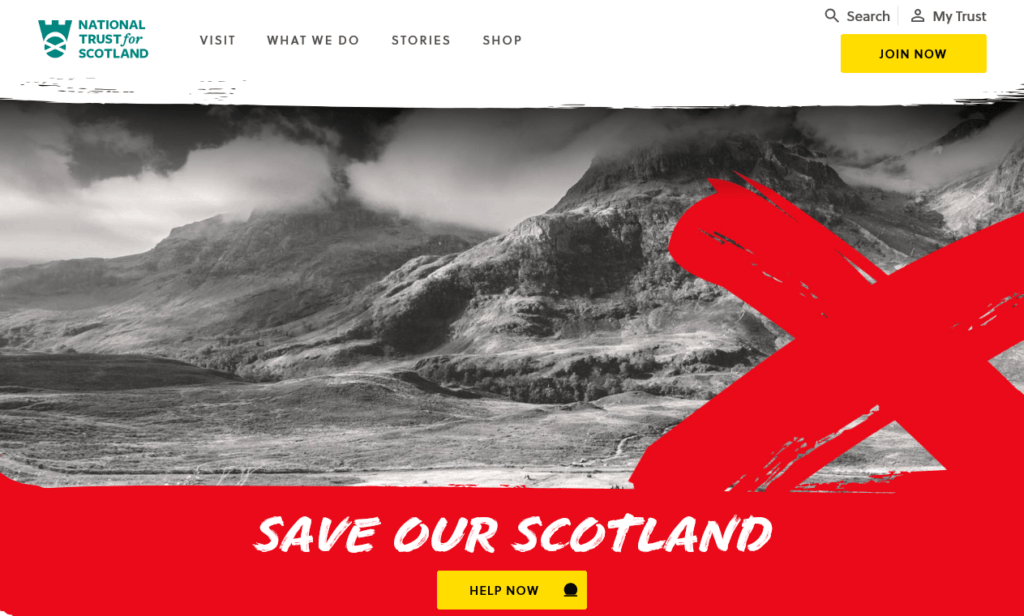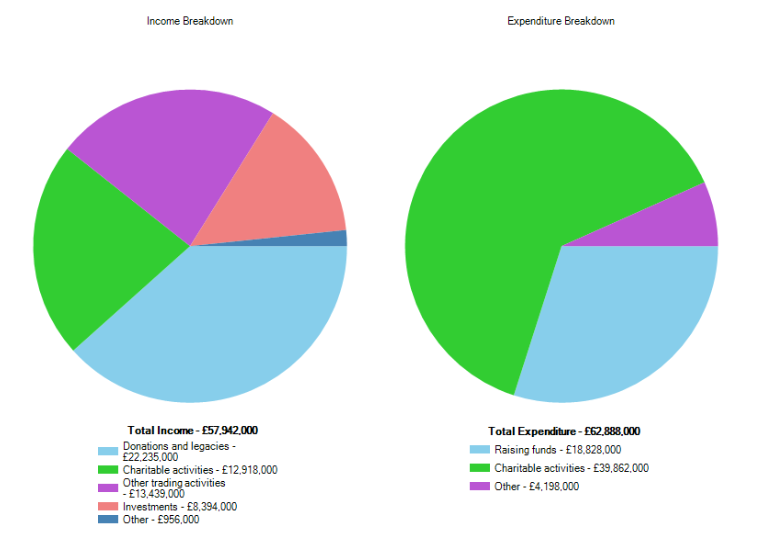
Save our Scotland, by saving the National Trust for Scotland (of which I am a member). And there isn’t any coyness about the ask or the reason for it:

The important thing there is ‘now and for the future’, I think. That projected loss of £28m is from a recent income of around £60m – that’s a big hit. And there are investment losses on top of those.

Here are the sources of income and expenditure;

Although the categories are broad, and I certainly haven’t dug into the accounts for previous years, it is difficult to see any income areas that won’t fall. Many wildlife NGOs, speaking from experience, and particularly those with landholdings, nature reserves and visitors centres, spend half of their money on staff. You just need an awful lot of staff to run land-based operations. It seems as though NTS is planning to make 75% of its countryside team redundant – serious stuff indeed! And it doesn’t look as if the Scottish government is very impressed by this approach – though I wonder how closely they’ve looked at the figures in order to judge. Charity trustees, like directors of many medium-sized or small businesses need to cut back their expenditure when income falls unless they have big reserves in the bank – and large financial reserves for charities have been frowned upon because regulators and others have said that money must be spent on charitable objects quickly and not stuck in the bank for ages.
Many charities have financial reserves of maybe three months’ running costs – lockdown started two and a half months ago and isn’t over, and its impacts certainly aren’t over and the future is still very unpredictable.
NTS appears to have done quite a lot of forward planning and is trying to raise emergency funds as one part of its plan for the future but that plan envisages much lower incomes in future and that necessitates a lower staff base (unless you have a money tree growing on your land).
There is a petition asking NTS not to cut jobs, but it doesn’t set out an alternative way to make the books balance. Signing this petition might make NTS think again about the scale of job cuts, but a donation of £30m or so might do more to alter those job losses at least in the short term.
NTS manages some amazing pieces of land including Mar Lodge, St Kilda and Ben Lawers, adding up to 76,000ha.
Here’s a very short video to help you decide to donate.
Having worked in and around wildlife NGOs for decades, and having been a trustee of some, there are some very hard decisions ahead for many. The fragmented nature of wildlife NGOs in the UK won’t help – we have far too many of them and in industry there would have been some mergers and takeovers already in response to this financial position. I’d encourage charity trustees to explore these options rather than all be fighting for the same small pot from hard-hit donors.
There is a lot more to say about the fate of our wildlife NGOs during and ‘after’ coronavirus and I’ll probably be coming back to this often.
[registration_form]
Much like the BBC asking people to defend it, many of the NTS’ previous forelock tugging attitude will leave it with an uphill battle. It needs to make the case for why I should give it money. Especially with the English Establishment’s tame pet Scot as president.
Ms Hyslop’s remarks, from whatever position she made them, do not make me think well of her. Just of themselves, they are self-contradicting nonsense.
Which doesn’t mean that NTS have done the huge re-think necessary. But then who has?
Bequests.
Random – the value of bequests is generally in property (or shares). Property (and shre) values will fall more than mortality rates will rise.
Neil Oliver is extremely unpopular in Scotland.
Amongst other things he has said Inyref2 is a ‘cancerous presence.’
A referendum that 63% of Scots want
https://talkingupscotlandtwo.com/2020/05/28/increase-in-support-for-second-independence-referendum/?c=8692#comment-8692
and that over 50% want to win
https://talkingupscotlandtwo.com/2020/06/05/only-1-in-6-independence-polls-in-2020-gives-no-a-lead-1/
Just lately he has shat his, metaphorical, pants by backing J. Karen Rowling’s little bout of transphobia too.
So he did something right then.
Put more eloquently
https://weegingerdug.wordpress.com/2020/06/11/the-uncomfortable-past/
P.S. He made a clip about modern slaves.
Yes of course we should target that but here is an idea, how about both.
And while NGOs and charities are desperately looking at new sources of money billions are lostt wasting food, buying bottled water and producing over and badly designed packaging. If we can find ways to convert even a small proportion of the money saved from reducing these into good causes we’re still talking about hundreds of millions and even billions of pounds created from literally nothing. These things should be getting fought anyway for the sake of the environment, another job currently not being done, so fund raising is an added bonus. I have fallen behind on a couple of prospective guest blogs I wanted to write about this so will bunker down and get them finished.
Les, do you read Naomi Klein by any chance, if not you should, you would love her books. I’m starting to sound as if I get royalties.
Its probably not that widely known, but the trust management team have been changing the direction of the NTS. Their big plan was to downsize and move towards fewer honeypot sites. They have already decimated the backroom professionals and were in the process of turning their attention on the countryside staff and the smaller properties. (They individuals making the decisions have no conservation background). There is a strong suspicion that the lockdown has provided them with a very convenient smoke-screen. The Scottish Government are aware of this and also annoyed that the Trust seems to using the furlough pay to bank roll the redundancy period.
Members of the trust have been given no say in the matter. The plan was presented as a done deal with no alternative options. The scale of the proposal is so colossal that it should be put before the membership. They do have plenty of reserves to allow them sufficient time for membership consultation.
As a conservationist, who wants the trust to continue to look after its reserves and their visitors, my sympathy is with the staff.
As they spend nearly a third of their income on fundraising that’s where they should cut back obviously, not on front-line staff
M Parry – really? At a time of decreased income one should cut the people who bring in the income? And I guess quite a lot of them may be on the ground staff anyway. Where is the front line?
They should certainly take a hard look at the return on investment their fundraising people give. Probably a lot of it is poor ROI. Many charities successfully raise the money they need with spends of 20% of income (and that’s ones with a lot less in legacy income than NTS). Some manage on 10% – 15%.
What are you raising all that money for if you just spend a third of it again on raising more? It’s the Red Queen isn’t it.
m parry – there is a trade off between ROI and amount raised. Would you rather raise £50 with a good ROI or £5m with a poorer ROI? Obviously £5m with brilliant ROI is best and £50 with rubbish ROI is worst. But the point is you can spend money but you can’t spend ROI.
Sad news, but not surprising. Mark, your comment regarding the fragmented nature of wildlife NGOs, an issue you have raised in the past, is more pertinent than ever now. Surely the NTS should now seriously consider merging with its much larger counterpart covering the rest of the UK – which is a much more financially sustainable organisation. I know this would be unpopular with the SNP, but I doubt the membership would mind much; their demographics suggest that only a minority are likely to be SNP supporters, and indeed the NTS seems to have a fair number of members from elsewhere in the UK (perhaps partly due to the lower subscription rates?) I suppose the major obstacle is that it’s hard to see the NT (rUK) benefiting financially, even in the long term, but from a conservation point of view, it must surely be a no brainer.
Downside of any merger such as you suggest is that devolution is with us and separation or independence looms.. In case no-one had noticed, there are 4 different health policies, education policies and environment policies.Scotland has a completely different land tenure and legal system. Merging with the NT (Eng/Wales) would cost a huge amount and not be a straightforward thing at all…….
Louise/Neil – Eng?Wales/NI actually. Wouldn’t be quick, either. And anyway, NT is facing difficulties too.
Thanks for the replies – just to point out that did actually refer to the NT as covering the remainder of the UK (which of course currently includes NI). I don’t see devolution as an obstacle as other conservation charities e.g. RSPB and John Muir Trust operate on a UK-wide basis. Nor should independence (if it happens) be an obstacle either; off the top of my head the Vincent Wildlife Trust also operates in the Republic of Ireland, for example. As Mark says, the finances are likely to be the biggest obstacle. Ultimately, perhaps mergers with still other conservation bodies e.g. RSPB, Wildlife Trusts, etc, would be the best way forward (and would no doubt help them financially too), but this would bring equally significant problems in terms of differences in policies and strategy.
Neil you did (Louis didn’t) and the NT is a strange geographical range.
The problem is not (mostly) having a UK-wide charity that acts across the UK (although Scotland is always the most difficult place in that respect) but it would be a lot more difficult to reconstruct a UK wide charity from devolved separate pieces these days.
RSPB and Wildlife Trusts have looked at merger seruiously twice in the past – I’d be surprised if it happenned.
Encouraging Charity Trustees to combine to save costs makes perfect sense to me; there are far too many all scrambling for the same pot of gold at the end of a rainbow. But that rainbow is different now it belongs to the NHS and charities are about to get the shock of their financial lives over the next year.
All of our conservation charities are overtly bloated, we has created these unwieldy corporate entities whose fundamental business strategy is that someone else gives you the money, basically – it’s welfare conservation style.
I don’t know how many of you have ever run a business? Those that have might reflect visiting the bank with a business plan, going in to meet the manager with the objective that someone else provides your income by donation, would probably have the manager curled-up laughing on the floor.
The charities needs reform, they should look to a commercial outlook which isn’t embedded in the 60s philosophy that they deserve to survive because of who and what they are. You only need to look at the high street brands that have and will go pop in the next few months for the charities business model.
We do need these charities to survive, but the emphasis needs to change from human benefits to the very essence they were set-up for – UKs wildlife.
I can’t see change within the very structure, our Trust has a unique relationship with most of the major organization and we get to talk to those in charge, the overriding impression we have is that all of them see each other as rivals – rivals in the financial stakes.
That’s not healthy and it fragments just what can and should be achieved as a solid unit working as one. I have little regard for the hierarchy of these charities; they live in a corporate work, of being career minded which I can relate too.
The charities are run on the basis that more money can be squeezed out of the goodwill lemon; so more fundraisers are hired, which begets more fundraiser to be employed to financially compensate for the previous fundraisers. All are salaried and pensioned, not a one off costs but a career benefit, that money has to come out the donation pot.
The RSPB for instance has an administrative ratio of 5:1 to reserve workers; most donators would like to think that their money would be used for conservation, not some plush office or expense account. Jobs in the future are going to have to be accountable, those that are doing the assessment will be the problem, who assesses their worth?
No one wants to see these people made redundant, it’s not their fault, but it highlights just how bad these charities have been run in the past.
Thomasd – well, it doesn’t highlight that at all – even though there is something in wht you say. But yours is a shallow analysis. Have you ever run a charity would be the smart-arse question to ask yopu (assuming the answer is no).
But we agree that there is too much competition for the same money.How would you fix that? Presumably you’d just sit and hope that some go bust?
I agree there are so many environmental charities consolidation seems reasonable. Comparing it to industry is scary. Boards of directors just seem to play draughts with companies, sell a chocolate bar maker there, buy a yogurt company here just to vindicate their existence. Bit like it Circus Maxima describes for the NTS: concentrate on your core business this year then next year diversification is all the fashion.
I would love to see the result of a focused management of the likes of butterfly conservation and a rewilding charity combining.
A telling quote from Thatcher, in 1977: ‘the Victorian era — the heyday of free enterprise in Britain — was also the era of the rise of selflessness and benefaction’. In the eyes of the small ‘c’ conservative, charity can be understood as the ‘good’ flipside of moral individualism. Put simply, greed is good, because it facilitates the ability of a rich person to do good, and in the eyes of a conservative rich people are more responsible than the state when it comes to running a society. And in the eyes of the small ‘c’ conservative, wealth equals success, which equals being a ‘good person’, and all good people give back to society through charitable works. This was the thinking behind Cameron’s ‘big society’ (remember that?).
I will not bother to unpick the tautologies behind this understanding of charity, other than to say that people tend to only donate to charities that suit their own personal interests, and rich people will tend to give more money to charity than poor people, even if they give less as a proportion of their overall wealth. Charity, then, is too often an expression of ‘soft power’ which facilitates cultural hegemony (for example, Andy Wightman has some things to say about the NTS’s historic close relationship with the landed gentry in his book The Poor had no Lawyers).
As state aid has dried up, thanks in no small part to the legacy of Thatcher, and as the coffers of the public are not so strong as they used to be, since 2010 or so charities have been forced to become more businesslike, selling teas, coffees, and, in the case of NTS, Harry Potter paraphernalia, alongside memberships. This leads to its own problems – when does a charity switch from selling teas and coffees to help it afford to achieve its charitable objectives, to becoming an organisation whose charitable objectives help it to sell teas and coffees?
Meanwhile, as the state has shrunk, charities have been forced to step in to perform functions which are vital for society, and which should really be the remit of the state. The collapse in funding for Natural England is a good example of this.
Charities, then, are public bodies which have to fundraise from the public, and private businesses whose primary function is not to make money. They have the worst of both worlds.
Is there a place for charity in society? Of course. Should environmental charities be rationalised? Probably – imagine the cost savings if NTS, RSPB and SWT could merge their management teams. But to ask these questions is to miss the bigger, more important questions:
Why is the future of so many of Scotland’s greatest national treasures, from which all of Scotland takes great benefits, subject to the whims and caprices of the fundraising ability of a membership organisation? Why is the fate of these sites, and the people who manage them, in the hands of an unelected Executive Committee?
Andrew – thank you – good comment!
Interested that RSPB and Wildlife Trusts twice seriously considered mergers.
Could efficiencies be made by merging just some functions? I realise that has problems of it’s own, but could be a massive efficiency gain from merging some things.
And the front-line work will certainly involve sharing and common working won’t it? As the overall aims are shared. If you have a truxor and your brother or sister charity needs one for their reserve, I think most conservation charities would share (and probably not even charge). Ditto sharing of expertise. I’d certainly hope so.
CAF provide a shared service to many charities (a quite a large cost in my experience), and Stewardship and things like Virgin Giving similarly, at much less cost. Can’t be beyond our collective wit to assist the conservation (or even the wider charity sector) with other shared services can it? Even buglife is an initiative of multiple conservation charities I gather, because inverts are vital but not sexy, so no-one was focusing on them.